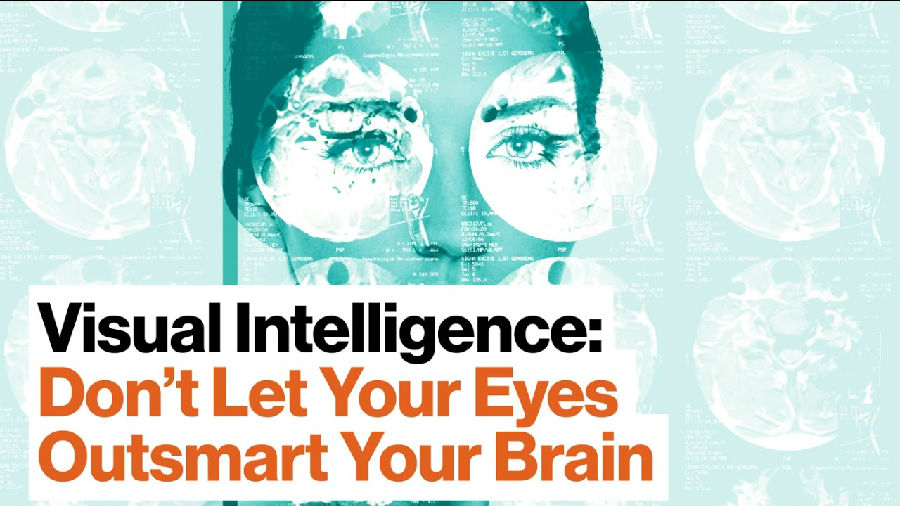(单词翻译:单击)
Visual intelligence is the concept that we see more than we can process
视觉智慧是大脑能对看见的信息进行处理
and it's the idea of thinking about what we see, taking in the information
通常来说 大脑无法及时处理过多的信息
and what do we really need to live our lives more purposefully and do our jobs more effectively.
而我们需要留下那些能让我们更有目地更高效生活的信息
I work across the professional spectrum.
我是专门研究光谱的
So I work with police officers and intelligence analysts and doctors and nurses and librarians,
我需要和警察 智力分析师 医生护士和图书管理员来一起合作
but what's interesting for me is that the four A's are applicable to all of that.
但是对我来说有趣的是这四条对他们来说都适用
And what they are is any new situation, any new problem, any new client, any new transaction, any new environment
无论你的处境 问题 客户 交易是什么 无论是处在什么样的环境中
that you're in you practice four A's.
这四条准则都适用
The first one is you assess your situation.

第一评估你的处境
What do I have in front of me?
我正面临着什么
What information is here?
在这有什么信息?
I want people to go beyond the four corners of what they think they see.
我希望你不要把目光局限于你认知中的四周
So this is what's in front of me; this is where I am. ask someone. This is my situation; here's where I am;this is what I see.
这就是我眼前看到的一切 这就是我所在的位置 告诉别人你的处境
Is there something here I might be missing?
问他 你是否有遗漏不妥之处
Because by asking someone else we realize that no two people see anything the same way?
通过问别人你会明白不同的人看事情的角度不一样 当然
So, of course, that doesn't work all the time but if you're in an office situation, if you're in a medical situation
这不一定时时适用 但如果你在政府与医疗体制下工作
and you have the opportunity to collaborate
你就有机会整合已知信息
you get the biggest picture of your assessment if you ask other people what they see as well.
你能得到更多关于你评估的描绘如果你向更多的人问前面一样的问题
The second step is to analyze the information. That's where you break it down and you say what's important?
第二步是分析信息 将得到的信息分解 并且问自己什么是重要信息
What do I need to prioritize? What's most important?
什么是当务之急的 什么是最重要的
And what don't I really have to worry about at all?
什么是我根本不需要担心的
I find that when you make a mental list in your head okay here's my situation
我发现当你在你的脑子里将这些信息列一个表的时候 好了 这就是我的处境
and you divide it into two categories, information I need, information I might need and information I definitely don't need.
你将信息划分成了两类 一类是我需要或可能需要的信息 另一类是我压根不需要考虑的信息
And for the information that you definitely don't need put it away
清除那些你根本不需要的信息
because our brains are so cluttered with so much information that
因为你的脑子里杂乱地充斥着太多的信息
If you can from the outset get rid of some information do it, but keep that middle category information that you might to need
从一开始就舍弃一些无用的信息留下可能会需要的
because you might have to draw on it when you don't realize that it's important.
因为你还没意识到其重要
It could become more important as the process goes on.
随着事情的进展 它可能会变得更加重要
And then the third A I thing is actually the most important.
接下来说第三点 也是我认为最重要的一点
It's how you articulate what you observe.
那就是将你观察到的事物表达出来
Whether you send an email, whether you pick up the phone, whether you tell a colleague,
无论是以发邮件 打电话 给同事讲述的方式
whether you write it down, the idea of putting into words what your observations are is the most important
还是将它写下来 将你观察到的事物用文字表达出来是最重要的一点
because I tell all my groups I don't know why this is but something gets lost from here to here to here.
我经常和我的团队成员讲 我总会在所思所说到所写方面有些许遗漏之处
Our brains and our eyes see something but when it comes to articulating those observations,
大脑和眼睛会告知我们所看到的东西的模样
whether is poor choice of words or an inability to communicate effectively there's a real loss that I'm trying to redress.
但当想要将其表达出来时 却发现词穷语尽这是一个损失 也是我一直想补救的损失
I ask people to be mindful of every word. Every word counts.
我要他人留心每一个字 每个字都很重要
And an example that I can give you that I give in the book was the investigation of the murder of Chandra Levy in Washington DC back in 2001.
举个栗子 调查早在2001年发生的Chandra Levy在华盛顿哥伦比亚特区被谋杀案时
When the instruction was given to look for the body the instruction was to look 100 yards from every trail in the park
当时指示是在案发地点范围内搜寻被害人尸体
where she disappeared, but when the instruction was repeated they said look 100 yards from every road in the park.
开始是对每隔100码的小径进行排查后面指令改为重复搜查每隔100码每条路
Now the change of one word from trail to road changed the whole scope of the investigation.
一字之差改变了警方整个搜查范围
So in that third A, in that articulating what you observe, I ask people be mindful of every word because someone is listening and every word counts.
所以对于第三点阐明你的观察 我希望你们留心每个字 因为言者无心 听者有意
And the fourth A is after you've assessed, analyzed and articulated
第四行动 在评估分析与连贯地表达你的所见后
what it is that you observe you adapt your behavior or you make a decision or as I like to say you act.
你应该学会改变你的行为 马上做出决定或采取行动
You take all that information then you make a judgment call based on those three other elements.
在前面三点的基础上整合信息然后做出决定
I want people to act according to their observations
我希望你能够通过你的观察思考后再行动如果你被质疑
so if you're ever questioned about why you made a certain decision,
为啥你会做这个决定 走这条路
why did you take a certain road, why did you solve a problem
为啥要用这种方式来解决问题
this way you're able to come back to the other A's and say well I thought the situation was this.
回溯前三点 这样做能够更好地阐明你的处境
This was the information I thought was important.
这就是我认为重要的信息
I perceived this therefore I made this decision.
我认为这个重要所以我才做出这个决定
Give yourself the tools to back up the decisions you make
找些工具来证明你的决定是正确的
so that when your questioned about your decisions
这样当你的决定受到质疑的时候
you have all the information you need to make a thoughtful purposeful and objective assessment of why you made the decision.
你就具备了为你的决定做一个详细的 目的明确的 客观的评估所需的全部信息


